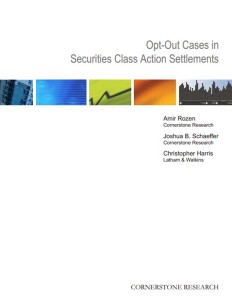Pension funds most likely to opt out, particularly in high-settlement cases
While one of the key reasons to utilize a third-party securities class action service provider is to monitor and identify opportunities to recover damages from a class action settlement, opting out is another potential avenue institutional investors can take. Historically funds have avoided opting out to pursue their own, separate lawsuit. New statistics reveal that opting out might be more common than previously thought – particularly for pension funds.
 Cornerstone Research compiled a deep analysis of class action opt outs, revealing some interesting findings. Opt outs most commonly occur in large settlement cases; in fact, 53 percent of class actions with settlements in excess of $500 million contain at least one related opt-out case. This is in sharp contrast to the three percent of overall class actions that result in at least one opt out case.
Cornerstone Research compiled a deep analysis of class action opt outs, revealing some interesting findings. Opt outs most commonly occur in large settlement cases; in fact, 53 percent of class actions with settlements in excess of $500 million contain at least one related opt-out case. This is in sharp contrast to the three percent of overall class actions that result in at least one opt out case.
The Cornerstone Research report evaluated 1,272 securities class action settlements that took place between January 1, 1996 and December 31, 2011. Among them, 38 cases had at least one opt-out plaintiff that filed its own actions against the defendant.
What’s interesting are the payouts received by plaintiffs who chose this route in hopes to increase their own recoveries. Of the 21 cases in which settlement details were available and obtained by researchers, plaintiffs pursuing their own cases received an average of 12.5 percent of the value of the class action settlement – with a median of just 3.8 percent.
There were, however, six cases among the 21 in which the settlement amount in an opt-out case exceeded 20 percent of the value of the class action settlement. Seven of the cases had opt-out settlement amounts in excess of $10 million. All seven settlements, however, took place during a three-year period between November 2004 and November 2007.
Based on the limited data available, Cornerstone surmises that it’s possible for opt-out entities to succeed in obtaining a larger settlement than they would have otherwise. But when evaluated against the higher costs and fees opt-out plaintiffs take on, there are also cases in which they fail to recover any net losses.
With such a broad spectrum of results, funds must carefully weigh the risks against potential rewards on a case-by-case basis, evaluating added costs and other factors. Pension funds, at present, are more likely to consider it a risk worth taking. An experienced third-party class action provider is a valuable partner in determining the best course of action to protect your interests.




